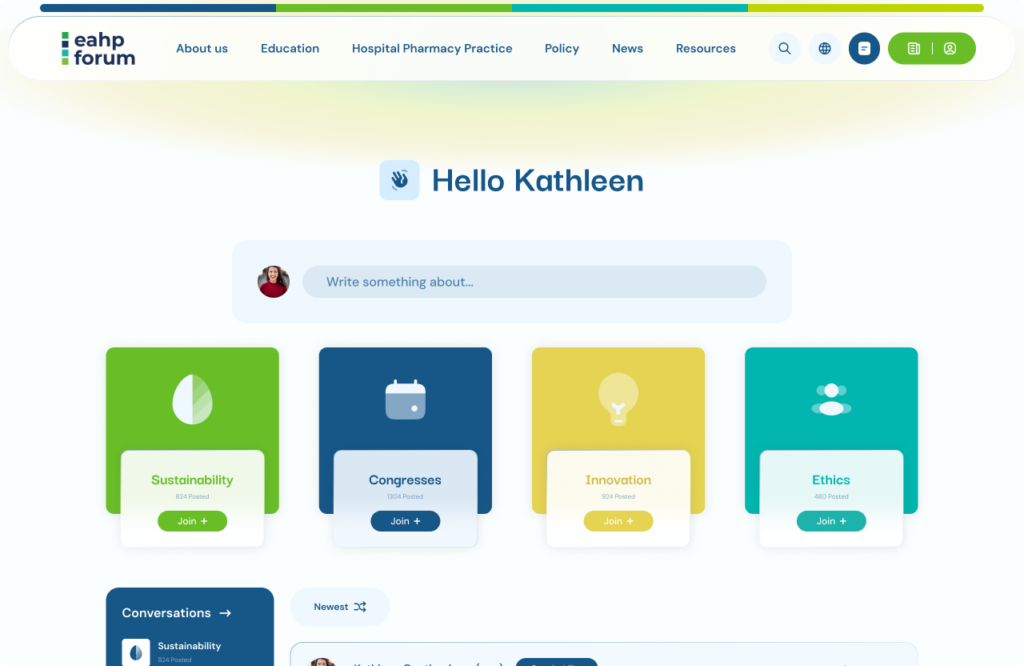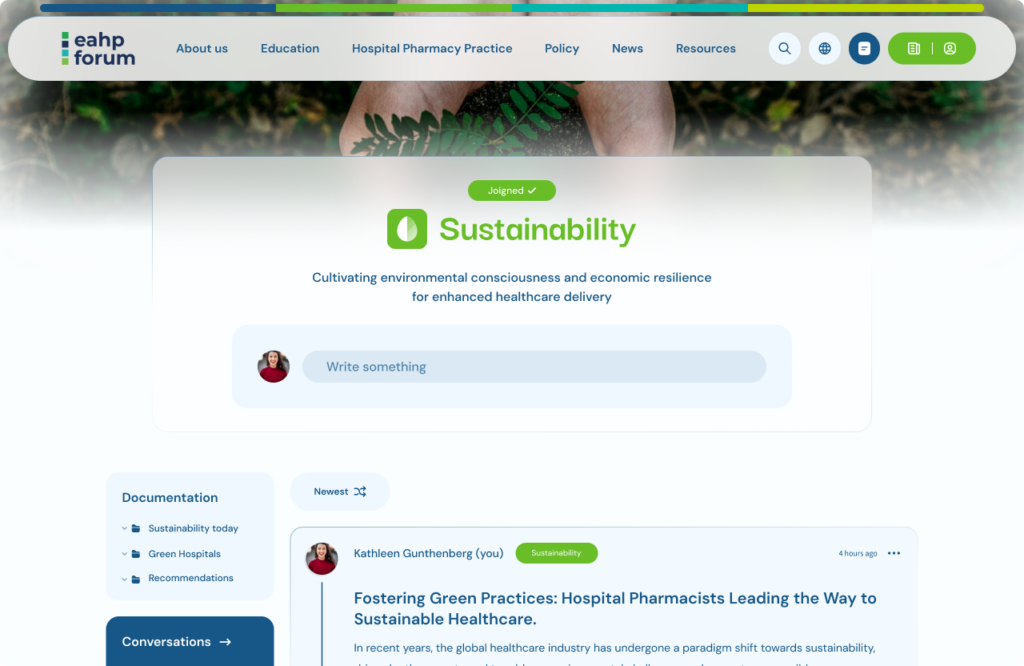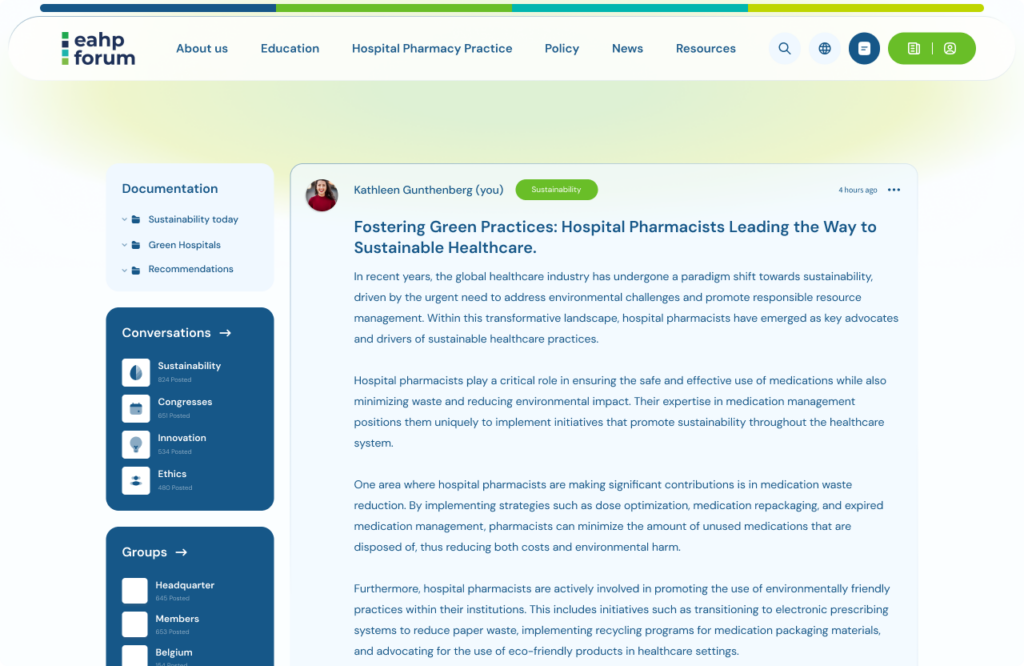The EAHP EU Monitor is a regular round up of news relevant to hospital pharmacy in Europe.
4th EAHP SIFO Synergy Certification Course – a few days left to register
 The European Association of Hospital Pharmacists (EAHP) and SIFO (Italian Association of Hospital Pharmacists – Società Italiana di Farmacia Ospedaliera e dei Servizi Farmaceutici) are holding the 4th EAHP-SIFO Synergy Certification Course from 11 to 12 May in Rome, Italy. Those who decide to join at short notice can still register for the event until next Monday, 8 May.
The European Association of Hospital Pharmacists (EAHP) and SIFO (Italian Association of Hospital Pharmacists – Società Italiana di Farmacia Ospedaliera e dei Servizi Farmaceutici) are holding the 4th EAHP-SIFO Synergy Certification Course from 11 to 12 May in Rome, Italy. Those who decide to join at short notice can still register for the event until next Monday, 8 May.
During this EAHP-SIFO Synergy Certification Course, attendees will be able to acquire more knowledge about a variety of topics including for example European policies on rare diseases and health insurance funds management, access to and approval of new medicines according to the EMA perspective, the management and the therapeutic pathways for rare diseases and the relevance of the rare disease’s networks and the role of genetics in rare diseases. In addition, the patient perspectives and available patient support programmes in Europe related to rare diseases will also be explored.
On the second day, participants will look at the complexity of dispensing orphan medicines or medical devices for patients affected by rare diseases according to the experience of the hospital pharmacist as well as the role of real-world evidence for rare disease evaluation and the sustainability of innovative treatments.
Don’t miss the opportunity to join this interactive event with attendees from across Europe!
Register via the following LINK
Check out the programme HERE
Lessons learned from COVID-19 – an ECDC perspective
 At the beginning of May, the European Centre for Disease Prevention and Control (ECDC) released a report on the lessons learned from the COVID-19 pandemic. Areas for improvement include the health workforce, crisis preparedness, communication and engagement and data collection and analysis.
At the beginning of May, the European Centre for Disease Prevention and Control (ECDC) released a report on the lessons learned from the COVID-19 pandemic. Areas for improvement include the health workforce, crisis preparedness, communication and engagement and data collection and analysis.
Linked to the health workforce, ECDC concluded that in almost all Member States a sufficient number of trained public health staff is missing and pressure and burnout significantly decreased the capacity of the workforce. Unless funding is provided, staff retention could become problematic, resources at all administrative levels would need reshoring and emergency procedures for surge capacity will then be required.
To be better equipped for the next crisis, improved, flexible and scalable preparedness plans are needed and the role of public health would need to be anchored in decision-making and crisis management structures. Digitalisation is a key success factor for the collection and analysis of data and evidence. However, systems would need to be further enhanced in terms of agility, adaptability, flexibility, and robustness. Training and guidance on risk communication and community engagement should be prioritised, and the communication capacity with the public and the media should also be strengthened to be better prepared for the future.
In relation to the four-lesson areas concrete follow-up actions for ECDC were included. These touch for example on the provision of short courses for the health workforce, facilitation of preparedness plan exchange between Member States, fostering social and behavioural research in preparedness planning and re-engineering and integrating the IT systems supporting EU/EEA surveillance.
Read the report HERE
Guidance for hazardous medicinal product management
 At the end of April, the European Commission released a Guidance for the safe management of hazardous medicinal products at work. It seeks to provide practical examples for reducing the workers’ exposure to hazardous medicinal products across all lifecycle stages, including production, transport and storage, preparation, administration to human patients and animal patients, as well as waste management.
At the end of April, the European Commission released a Guidance for the safe management of hazardous medicinal products at work. It seeks to provide practical examples for reducing the workers’ exposure to hazardous medicinal products across all lifecycle stages, including production, transport and storage, preparation, administration to human patients and animal patients, as well as waste management.
The new guide was developed to increase awareness about the risks of hazardous medicinal products among employers and workers that might come into contact with or handle these products. It offers good practices and provides a broad range of useful reference points and support for training activities for a wide audience in a user-friendly way. Numerous workshops, meetings and on-site visits in different member states contributed to the creation of this guidance to which EAHP also inputted. The work was undertaken by the European Commission as one of the concrete actions included in its EU Strategic Framework on Health and Safety at Work 2021-2027. The guidance is a non-binding document for workers, employers, public authorities and safety experts to underpin their approaches to workers’ protection from hazardous medicinal products.
Access the Guidance HERE
DARWIN EU completed its first studies
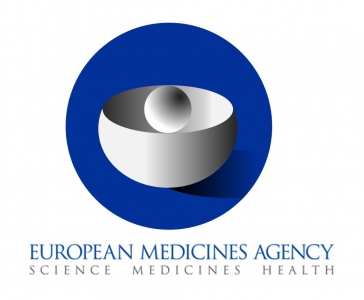 The Data Analysis and Real-World Interrogation Network (DARWIN EU) Coordination Centre has accomplished its first year of activity. Following its establishment in February 2022, the network has started studies using real-world data (RWD) from across Europe to better understand diseases, populations and the uses and effects of medicines.
The Data Analysis and Real-World Interrogation Network (DARWIN EU) Coordination Centre has accomplished its first year of activity. Following its establishment in February 2022, the network has started studies using real-world data (RWD) from across Europe to better understand diseases, populations and the uses and effects of medicines.
By collecting RWD, DARWIN EU aims to generate Real World Evidence (RWE) to support the decision-making of the European Medicines Agency (EMA) and scientific and national competent authorities in EU Member States throughout regulatory processes. The work of EU DARWIN complements the evidence generated by randomized controlled clinical trials and contributes to more data-driven regulatory decision-making.
These first studies have supported the establishment of analytical pipelines and processes and were based on previous procedures and requests for RWE from EMA committees. In the coming months, DARWIN EU will continue its collaboration with stakeholders and its work on use case-pilots with the European Centre for Disease Prevention and Control and bodies responsible for health technology assessments. DARWIN EU is also participating in a pilot for the future European Health Data Space.
DARWIN EU is a platform established by EMA and the European Medicines Regulatory Network to provide timely and evidence on the use, safety and effectiveness of medicines and vaccines for human use. It is based on real-world healthcare databases all across the European Union.
More information can be found HERE
Further information concerning the network is available HERE
EUnetHTA 21 Guidance document published
 EunetHTA 21 has published a Guidance and template for the interaction with healthcare professional, patient representatives and other experts on 4 April, where it provides a framework for the involvement of external experts in both the Joint Scientific Consultations (JSCs) and Joint Clinical Assessments (JCAs).
EunetHTA 21 has published a Guidance and template for the interaction with healthcare professional, patient representatives and other experts on 4 April, where it provides a framework for the involvement of external experts in both the Joint Scientific Consultations (JSCs) and Joint Clinical Assessments (JCAs).
The guidance document explains
- the role of external experts during the production of JSCs and JCAs,
- the recruitment of external experts,
- the process for collecting their input,
- the documentation of input in the JSC Final Written Recommendations or JCA reports,
- the evaluation process for their involvement, and
- describe the EUnetHTA 21 recommended process for stakeholder involvement.
The document is primarily intended to provide a recommended process for external expert and stakeholder involvement for JSC and JCA to be conducted in EUnetHTA 21 and under the Health Technology Assessment Regulation.
EUnetHTA was established to create an effective and sustainable network for HTA across Europe. It supports collaboration between European HTA organisations that brings value from the European, through the national, to the local levels. EUnetHTA 21 builds on the achievements and lessons learned from the EUnetHTA and focuses on supporting the future EU HTA system under the HTA Regulation.
The Guidance document on patient and healthcare professional representatives can be found HERE
The template for healthcare professionals’ stakeholders for JCA is available HERE
Further information concerning EUnetHTA could be accessed HERE
EJHP: The May issue is out!
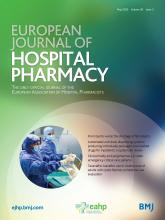 The May issue of the European Journal of Hospital Pharmacy (EJHP) is available and with it a new systematic review, two case reports and several interesting original research articles, in addition to the EAHP and the EU news. The editorial focuses on the shortage of fibrinolytics, while some of the topics addressed by the original research articles include clinical frailty and polypharmacy in older emergency critical care patients, risk reduction of non-sterility of aseptic handling in hospital pharmacies and the availability of antidotes in Moroccan hospitals.
The May issue of the European Journal of Hospital Pharmacy (EJHP) is available and with it a new systematic review, two case reports and several interesting original research articles, in addition to the EAHP and the EU news. The editorial focuses on the shortage of fibrinolytics, while some of the topics addressed by the original research articles include clinical frailty and polypharmacy in older emergency critical care patients, risk reduction of non-sterility of aseptic handling in hospital pharmacies and the availability of antidotes in Moroccan hospitals.
Read the May edition of the EJHP HERE
[Consultations]
Drug Information Centre Survey
The University Hospitals of Leuven (UZ Leuven) is developing a drug information centre (DIC) to expand their current services. A DIC is defined as a centre that provides technical and scientific information about drugs in an objective and timely manner to ensure the safe and effective use of therapeutic and diagnostic pharmaceuticals. To support the development of the DIC in UZ Leuven a survey has been designed aiming to collect information about the operations, service characteristics and governance of DIC’s already operating in Europe. This survey will take approximately 3-20 minutes to complete depending on the path which is followed.
Contribute to the survey via the following LINK
Bedside clinical pharmacists in Europe
In this research, organized by the Semmelweis University, Hungary the position of bedside clinical pharmacists in hospitals will be assessed to gain insight into the routine practices and the provided clinical pharmacy services. The researchers would like to hear your opinion based on your experiences, so there are no correct or incorrect answers. It takes about 15 minutes to complete the questionnaire.
Contribute to the survey via the following LINK
European Paediatric Formulary: Clonidine hydrochloride oral solution
The European Directorate for the Quality of Medicines & HealthCare (EDQM) has just released Issue 6 of Pharmeuropa PaedForm, in which the draft text for Clonidine Hydrochloride 10 micrograms/mL Oral Solution is published for public consultation with a view to its later inclusion in the European Paediatric Formulary. The deadline for comments is 30 June 2023. This is the seventh monograph elaborated on by the PaedF Working Party. EDQM welcomes all comments on this new monograph from users and interested parties.
Learn more about this consultation HERE
European Commission: Stakeholders’ Targeted Consultation on EU4Health
The European Commission is inviting key stakeholders to take part in a targeted consultation on the current and future Union health priorities, strategic orientations and health needs that need to be addressed through future EU4Health annual work programmes. The deadline for comments is 8 May 2023.
Access the consultation HERE





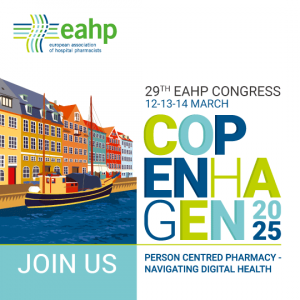
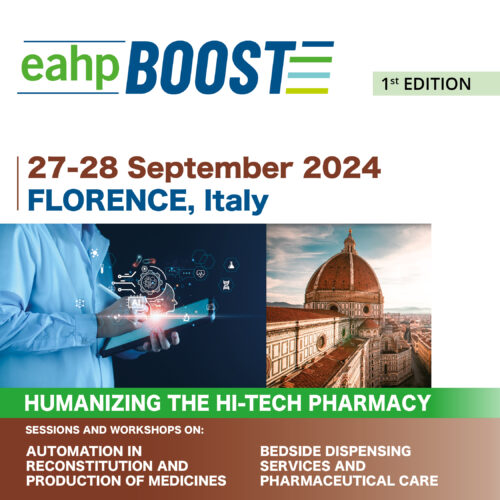
















 The European Association of Hospital Pharmacists (EAHP) and SIFO (Italian Association of Hospital Pharmacists – Società Italiana di Farmacia Ospedaliera e dei Servizi Farmaceutici) are holding the 4th EAHP-SIFO Synergy Certification Course from 11 to 12 May in Rome, Italy. Those who decide to join at short notice can still register for the event until next Monday, 8 May.
The European Association of Hospital Pharmacists (EAHP) and SIFO (Italian Association of Hospital Pharmacists – Società Italiana di Farmacia Ospedaliera e dei Servizi Farmaceutici) are holding the 4th EAHP-SIFO Synergy Certification Course from 11 to 12 May in Rome, Italy. Those who decide to join at short notice can still register for the event until next Monday, 8 May. At the beginning of May, the European Centre for Disease Prevention and Control (ECDC) released a report on the lessons learned from the COVID-19 pandemic. Areas for improvement include the health workforce, crisis preparedness, communication and engagement and data collection and analysis.
At the beginning of May, the European Centre for Disease Prevention and Control (ECDC) released a report on the lessons learned from the COVID-19 pandemic. Areas for improvement include the health workforce, crisis preparedness, communication and engagement and data collection and analysis. At the end of April, the European Commission released a Guidance for the safe management of hazardous medicinal products at work. It seeks to provide practical examples for reducing the workers’ exposure to hazardous medicinal products across all lifecycle stages, including production, transport and storage, preparation, administration to human patients and animal patients, as well as waste management.
At the end of April, the European Commission released a Guidance for the safe management of hazardous medicinal products at work. It seeks to provide practical examples for reducing the workers’ exposure to hazardous medicinal products across all lifecycle stages, including production, transport and storage, preparation, administration to human patients and animal patients, as well as waste management. The Data Analysis and Real-World Interrogation Network (DARWIN EU) Coordination Centre has accomplished its first year of activity. Following its establishment in February 2022, the network has started studies using real-world data (RWD) from across Europe to better understand diseases, populations and the uses and effects of medicines.
The Data Analysis and Real-World Interrogation Network (DARWIN EU) Coordination Centre has accomplished its first year of activity. Following its establishment in February 2022, the network has started studies using real-world data (RWD) from across Europe to better understand diseases, populations and the uses and effects of medicines. EunetHTA 21 has published a Guidance and template for the interaction with healthcare professional, patient representatives and other experts on 4 April, where it provides a framework for the involvement of external experts in both the Joint Scientific Consultations (JSCs) and Joint Clinical Assessments (JCAs).
EunetHTA 21 has published a Guidance and template for the interaction with healthcare professional, patient representatives and other experts on 4 April, where it provides a framework for the involvement of external experts in both the Joint Scientific Consultations (JSCs) and Joint Clinical Assessments (JCAs). The May issue of the European Journal of Hospital Pharmacy (EJHP) is available and with it a new systematic review, two case reports and several interesting original research articles, in addition to the EAHP and the EU news. The editorial focuses on the shortage of fibrinolytics, while some of the topics addressed by the original research articles include clinical frailty and polypharmacy in older emergency critical care patients, risk reduction of non-sterility of aseptic handling in hospital pharmacies and the availability of antidotes in Moroccan hospitals.
The May issue of the European Journal of Hospital Pharmacy (EJHP) is available and with it a new systematic review, two case reports and several interesting original research articles, in addition to the EAHP and the EU news. The editorial focuses on the shortage of fibrinolytics, while some of the topics addressed by the original research articles include clinical frailty and polypharmacy in older emergency critical care patients, risk reduction of non-sterility of aseptic handling in hospital pharmacies and the availability of antidotes in Moroccan hospitals.